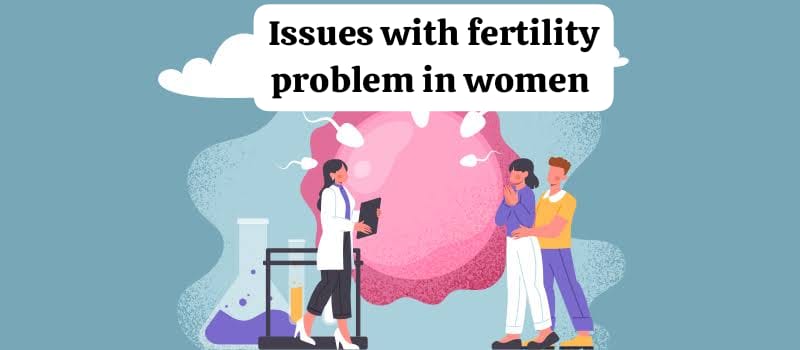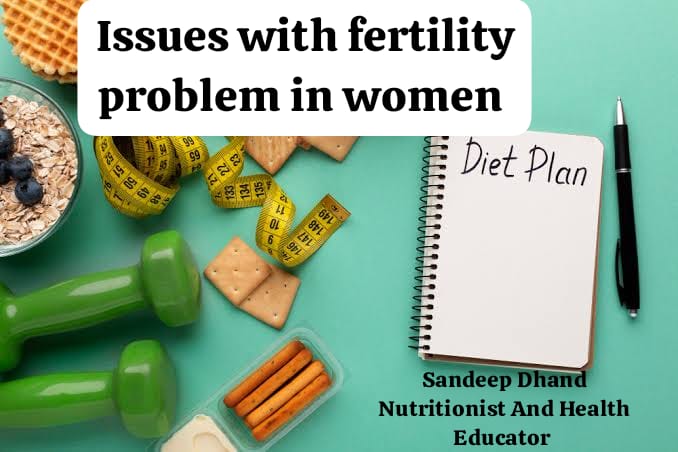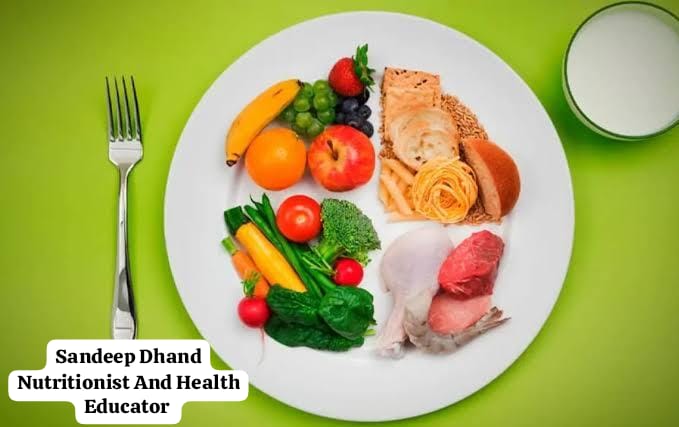Sandeep Dhand
Nutritionist And Health Educator
Fertility problems in women are increasingly common and can stem from various medical, lifestyle, and environmental factors. These issues often make it difficult for women to conceive naturally. Below is a comprehensive look at the causes, symptoms, and how diet and lifestyle changes can help manage and improve fertility.
What Are Fertility Problems?

Fertility issues in women occur when there is difficulty in becoming pregnant despite regular unprotected intercourse for a year or more. These issues may arise due to problems with ovulation, hormonal imbalances, or structural issues in the reproductive system.
Common Causes of Fertility Problems
- Ovulation Disorders
Conditions like polycystic ovary syndrome (PCOS) or thyroid imbalances can disrupt ovulation, preventing the release of eggs. - Age-Related Decline
Fertility naturally declines with age, especially after 35 years, due to reduced egg quality and quantity. - Endometriosis
This condition occurs when tissue similar to the uterine lining grows outside the uterus, affecting fertility. - Blocked Fallopian Tubes
Blockages caused by infections or pelvic inflammatory disease prevent the sperm from reaching the egg. - Uterine Problems
Uterine fibroids or polyps can interfere with implantation or pregnancy maintenance. - Lifestyle Factors
Smoking, excessive alcohol consumption, high stress, and being overweight or underweight are major contributors to fertility issues.
Symptoms of Fertility Issues
Irregular or absent menstrual cycles.
Pain during intercourse or menstruation.
Repeated miscarriages.
No conception after a year of trying.
How Diet Can Improve Fertility

Diet plays a critical role in improving fertility and supporting overall reproductive health. Here’s how specific nutrients and foods can make a difference:
- Focus on Antioxidant-Rich Foods
Antioxidants like vitamins C and E, zinc, and selenium neutralize free radicals in the body, which can damage egg cells.
What to Eat: Berries, nuts, seeds, leafy greens, and citrus fruits.
- Consume Healthy Fats
Healthy fats regulate hormones and improve egg quality. Avoid trans fats, which are linked to infertility.
What to Eat: Avocados, olive oil, nuts, seeds, and fatty fish like salmon.
- Include Complex Carbohydrates
Refined carbs can lead to insulin spikes, which may disrupt ovulation. Opt for complex carbs with a low glycemic index.
What to Eat: Whole grains (quinoa, brown rice), legumes, and vegetables.
- Get Enough Protein from Plant Sources
Plant-based proteins improve fertility by balancing hormones and reducing inflammation.
What to Eat: Lentils, chickpeas, tofu, and beans.
- Don’t Forget Iron and Folate
Iron improves ovulation, while folate is crucial for egg health and reducing birth defects.
What to Eat: Spinach, kale, fortified cereals, and lean meats.
- Avoid Excessive Sugar and Processed Foods
Processed foods and sugary drinks can cause hormonal imbalances. Reducing sugar intake stabilizes insulin levels, benefiting ovulation.
What to Avoid: Soda, pastries, chips, and fast food.
- Stay Hydrated
Proper hydration improves cervical mucus, which helps sperm travel to the egg.
What to Drink: Water, herbal teas, and fresh juices.
Lifestyle Changes to Complement Diet

- Maintain a Healthy Weight
Being overweight or underweight can disrupt hormonal balance. Aim for a BMI within the normal range. - Exercise Regularly
Moderate exercise helps improve insulin sensitivity and reduces stress, both of which support fertility. Avoid excessive or intense workouts as they can affect ovulation. - Manage Stress
Chronic stress disrupts the hypothalamus, which controls the hormones responsible for ovulation. Practice yoga, meditation, or deep breathing exercises. - Limit Caffeine and Alcohol
High caffeine intake is linked to delayed conception, while excessive alcohol can lower fertility. - Quit Smoking
Smoking damages egg cells and accelerates ovarian aging. Quitting improves fertility significantly.
Supplements to Support Fertility
Prenatal Vitamins: Rich in folic acid and other essential nutrients.
Vitamin D: Supports ovarian function.
Omega-3 Fatty Acids: Found in fish oil, they improve egg quality.
Coenzyme Q10 (CoQ10): Enhances mitochondrial function in eggs.
When to See a Doctor
If you’ve been trying to conceive for over a year (or six months if over 35) without success, consult a fertility specialist. Early diagnosis and intervention can significantly improve outcomes.
Conclusion
Fertility issues in women are often influenced by a combination of medical and lifestyle factors. While some causes require medical intervention, adopting a nutrient-rich diet and healthy lifestyle can significantly enhance fertility. Remember, every woman’s body is different, so it’s essential to seek personalized advice from a healthcare professional for the best results.
With a balanced approach to nutrition and self-care, many women can improve their chances of conceiving naturally.
